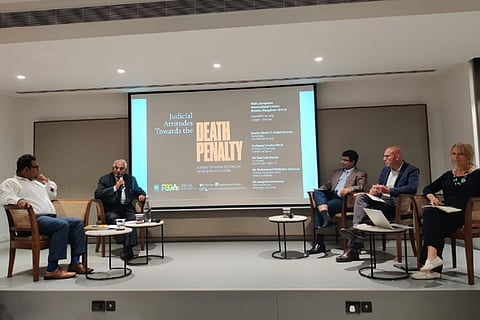

The global discourse has been moving away from death penalty for years – according to Amnesty International, there was a 31% decline in the number of executions recorded worldwide from 2017 to 2018; and by last year end, 142 countries had abolished capital punishment in law or practice, and 106, for all crimes. However, India is not yet in that list.
On Thursday, Project 39A, a part of National Law University, Delhi, organised a panel discussion on ‘Judicial Attitudes to Death Penalty in India and Bangladesh’ in Bengaluru. The initiative describes itself as being named after section 39A of the Indian Constitution that “furthers the intertwined values of equal justice and equal opportunity by removing economic and social barriers”; and provides free legal aid to those on death row in India.
The panel discussion was based on studies conducted by interviewing former judges in India and Bangladesh as well as research carried out by the UK-based Death Penalty Project on public opinion on death penalty. It was found in both the Bangladesh and India that most judges favoured retention of capital punishment because they believed it was a deterrent, despite lack of empirical evidence to support the same.
What the studies found
60 former Supreme Court judges were interviewed for the study in India, while 30 retired district and sessions court judges were interviewed in Bangladesh.
“While all judges recognised the crisis in the criminal justice system, they should high confidence in death penalty for deterrence,” said Dr Anup Surendranath, Assistant Professor at NLU.
The “crisis” here refers to rampant custodial torture of the accused, malpractices like planting of evidence by investigating authorities, and how the poor and underprivileged are often the ones who get trapped in the system.
“The Bangladeshi judges we interviewed expressed frustration with the criminal justice system – especially with police and public prosecutors where they said corruption was rampant,” Dr Muhammad Mahbubur Rahman, a professor in the Department of Law, Dhaka University said.
Experts said that this disproved Marshall’s hypothesis, developed by Thurgood Marshall, an associate justice who was in the United States Supreme Court from 1961 to 1991. He said that people’s support for death penalty had to do with their lack of knowledge about it. “However, here we had people who knew the criminal justice system in and out, and yet were favouring capital punishment,” Dr Anup observed.
Some judges even justified the use of custodial torture of the accused by police and investigating officials – the same proportion in India and Bangladesh incidentally, pointed out Professor Carolyn. In Bangladesh, six of the 30 judges interviewed justified it; in India, the number was 12 out of 60 judges.
Life and death depend on judge’s discretion
The studies also found that whether an accused will get death penalty will depend entirely on the judge’s discretion. For instance, Dr Rahman revealed that of the 237 death sentences given by 28 of the 30 judges interviewed, one single judge awarded 100 of the death penalties. “61% of the death penalties were given by just three judges,” he noted. Findings were similar in India.
This is in violation of the principle that death penalty should only be given in the rarest of rare cases. Referring to Bachan Singh v State of Punjab case here, where Supreme Court said that life imprisonment should be the norm, and death, an exception, the panellists argued that India was seeing a breakdown of the rarest of rare doctrine.
The doctrine lays down mitigating and aggravating factors for awarding death. Circumstances that would mitigate death penalty are factors like extreme emotional and mental disturbance of the accused, the accused being very young or very old, the possibility of him/her being rehabilitated and so on.
However, panellist Supreme Court Justice (retd.) V Gopala Gowda noted that instead of the above factors, it is the background of the judge, his/her mindset and personal inclinations are what influence their decision to award death in a case. “Without knowledge of human rights discourses, it is left to their discretion,” he said.
Public opinion on death penalty
Carolyn Hoyle, professor of criminology at Oxford University; further pointed out that while public opinion should not have a bearing on the decision to give a death sentence, it has been found that many judges refer to the “collective conscience” of the people to justify it.
Death Penalty Project co-founder Saul Lehrfreund shared that in their dialogue with retentionist countries, many governments had justified death penalty on grounds that the public was in favour of it. Unlike the judges though, Marshall’s hypothesis was found to apply in public opinion surveys taken by the UK-based organisation in several retentionist countries.
“In China, out of the 4,500 people surveyed, only 3% said they had a lot of interest in death penalty. In Malaysia, of the 1500 people interviewed, only 6% claimed to be well-informed on the issue,” Saul said. “Public support for death penalty is predicated on the assumption that there aren’t any wrongful convictions and that the system works.”
Per Marshall’s hypothesis, public opinion in favour of death penalty was found to reduce significantly when people were made aware of the flaws in the criminal justice system, and that innocent people could be sent to the gallows in wrongful convictions, surveys showed. “In China, the opinion in favour of death penalty reduced from 58% to 25% when they were given this information. In Malaysia, it dropped from 91% to 33%, and in Trinidad, from 89% to 35%,” Saul said.
When a question was raised in the audience on whether abolishing death penalty would impinge on victim rights, the panellists agreed that people had been found to accept the next severe punishment - life imprisonment - fairly easily when countries have done away with capital punishment. “We cannot retain victim rights by taking away accused rights. It’s a false dichotomy,” Professor Carolyn said.